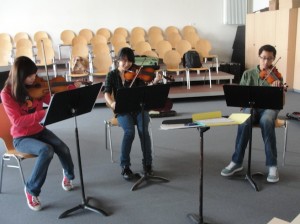Every Monday in orchestra is a listening/discussion/devotional day. It’s a good way to start the week – let the kids relax, but get them thinking.
Today I played “Meadows of Heaven” by the band Nightwish. Here are the lyrics:
I close my eyes
The lantern dies
The scent of awakening
Wild honey and dewChildhood games
Woods and lakes
Streams of silver
Toys of olden daysMeadows of heaven
The flowers of wonder
And the hidden treasures
In the meadow of life
My acre of Heaven
A five-year-old winter heart
In a place called home
Sailing the waves of oldMeadows of heaven
Rocking chair without a dreamer
A wooden swing without laughter?
Sandbox without toy soldiers
Yuletide without the FlightDreambound for life
Flowers wither, treasures stay hidden
Until I see the first star of fallI fall asleep
And see it all:
Mother’s care
And colour of the kitesMeadows of heaven
The song is about memories of childhood and the happy times of life. It is from the perspective of an old or middle-aged person looking back on life, remembering his/her toys, games, and mother’s care. The meadow of heaven is a metaphor for these happy memories of life. When you’re living in the happy moments, it’s like you are standing in that field, smelling the “wild honey and dew” and seeing the “flowers of wonder and the hidden treasure.” Yet later in life, it is bittersweet. Those “flowers wither, treasures stay hidden.” The happy times are no longer accessible; they are just dreams and memories. What despair – to be “dreambound for life”!
The songwriter looked back on happy memories and felt the pain of loss. As one of my students said today, “It’s sad. You can never go back.” Memories are just that – intangible reminders of something you once had. This is why homesickness is so painful. You remember all the good things of family and home, but they are unattainable.
Without the hope of a REAL Meadow of Heaven (an eternity with God), it can be depressing to look back on life because all you see is the loss of what you once had. Thankfully, as believers we can look forward to the true Meadow of Heaven, where the beauty of God will be beyond flowers that wither, and there will be no more loss.
From a worldly perspective, the end of life is decay – “flowers wither, treasures stay hidden.” That particular line reminded me of the verse that says “The grass withers and the flower falls, but the Word of our God stands forever” (1 Peter 1:24-25). If we put our hope in earthly memories, they will all fade. But if we hope in God, we will have an eternity of exploring what is now hidden. “For now we see in a mirror dimly, but then face to face” (1 Corinthians 13:12).
I just finished reading “Out of the Silent Planet” by C.S. Lewis. He provides an interesting view on memories. As Dr. Ransom explores the planet Malacandra, he meets a species of inexplicably contented beings. He asks them to explain why they do not incessantly wish for more of the good things they have. Here is the explanation:
“A pleasure is full grown only when it is remembered. You are speaking, [Human], as if the pleasures were one thing and the memory another. It is all one thing. What you call remembering is the last part of the pleasure. When you and I met, the meeting was over very shortly, it was nothing. Now it is growing something as we remember it. But still we know very little about it. What it will be when I remember it as I lie down to die, what it makes in me all my days till then — that is the real meeting. The other is only the beginning of it.”
Our memories shape us into who we are and become part of the fabric of our lives. Rather than seeing memories as loss of the real thing, we can see the memory as part of the substance.
At this point in the discussion, I asked the students to consider the people in the nursing home (we will be performing there this Wednesday). During our discussion, they realized that those people in the nursing home have many memories from their entire lives. It can be frustrating to remember what your experiences but to be trapped in a body that can no longer do what it used to do.
I think my students (and most people) tend to think of old people as something different, almost alien. They have a hard time even seeing them as people. Today, though, I think they started to actually identify with the people in the nursing home. That identification came partly with fear and resistance. One of my students said, “I don’t want to get old!” when she realized that she will probably get old one day and quite possibly feel trapped and confined. Another student offered a different perspective – “But it’s good to get old, because it means you didn’t die in the middle of your life.”
This Wednesday when we perform, our music may be a link to some of the memories of the past. It may stir up emotions, or it may be a pure escape from the walls of the nursing home. Our music will bless the elderly people at the nursing home, but I pray that the students will also gain a new appreciation for them and for all the memories they have to offer.

